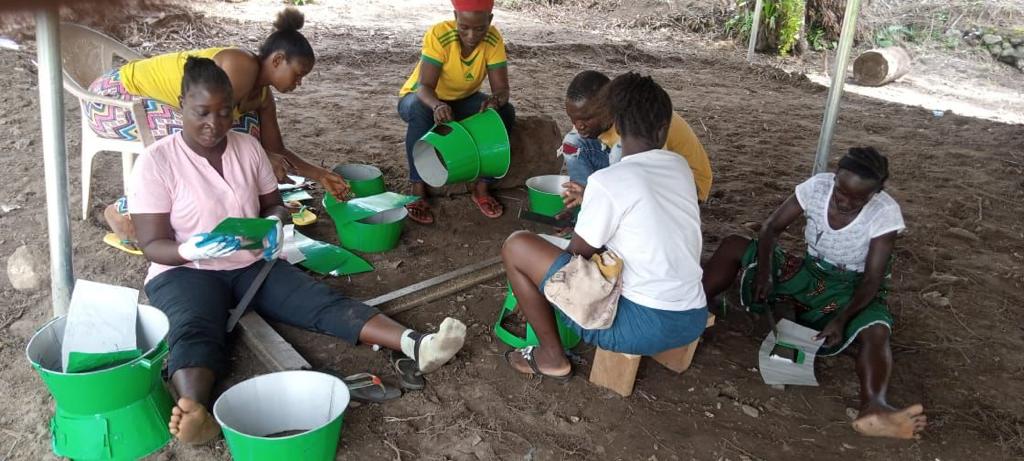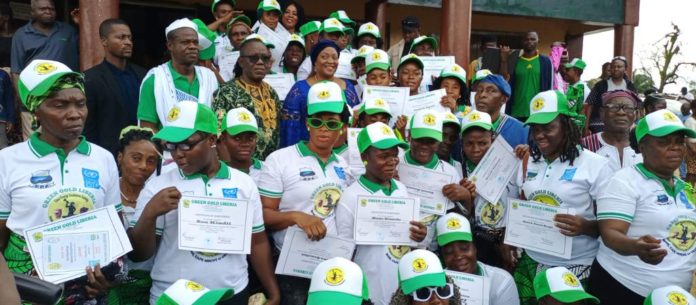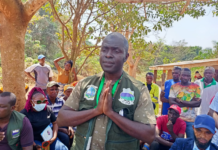Monrovia, Liberia; 14 July 2022: Forty-five women selected from Grand Cape Mount, Bomi and Gbarpolu counties have received certificates after completing a one and half month’s training in the production of Eco stoves.
The training was organized by the Environment Protection Agency (EPA) in partnership with Green Gold Liberia and supported by UNDP Liberia through its Energy and Environment (E&E) Programme.
The initiative is linked to livelihood diversification and access to renewable energy to support vulnerable communities especially women, youth, and people with disabilities to promote socio-economic inclusion.
It is also important for the successful implementation of Liberia’s Nationally Determined Contributions (NDCs) which has as one of its targets, the production of three hundred thousand (300,000) eco-stoves or energy efficient cook-stoves by 2030.
Serving as key-note speaker at the graduation ceremony held in Tubmanburg, Bomi County on 9 July 2022, Vice President, Jewel Howard Taylor admonished the graduates to put the training into practice, noting that the use of the eco-stove is important for environmental management and promotes good health, safety and empowerment.
“This means that the quantity of wood and or charcoal used for cooking and heating will reduce, you will have a safe cooking environment that keeps you healthy with less smoke that affects your eyes and lungs, and you will save more money to use for other essential things,” emphasized the Liberian Vice President.
She used the occasion to officially dedicate a training center built in Tubmanburg where the training was conducted.
The center was turned over to the Bomi County Authority by Green Gold Liberia after the graduation program and will be used to produce clean cook stoves. The Vice President appealed to the EPA and UNDP to construct two additional training centers in Gbarpolu and Grand Capemount counties respectively.
The Executive Director of the EPA, Mr. Wilson Tarpeh, reiterated the call by the Vice President for the women to fully utilize the skills acquired, adding that they have a responsibility to ensuring that Liberia meets its NDCs target of producing and using 300,000 clean cook stoves by 2030.
Professor Tarpeh assured the Vice President that the construction of the two training centers in Gbarpolu and Grand Cape Mount counties will form part of the UNDP/GoL annual work plan for 2023.
Making remarks on behalf of UNDP Liberia Resident Representative Stephen Rodriques, Moses Massah of the Energy and Environment Portfolio, acknowledged the partnership with the EPA in the fight against an increase in Green House Gas (GHG) emissions.

He said the use of traditional cookstoves impacts the health and well-being of poor families as well as the natural environment because the cutting down of trees to use as firewood and charcoal leads to deforestation and an increase in GHG emissions.
“The use of energy efficient cook stoves has the potential to reduce the demand for charcoal and firewood and will significantly help to halt and reverse the degradation of ecosystems,” said Massah.
He urged the graduates to form part of the plan to restore Liberia’s ecosystem. “Our survival depends on healthy ecosystems; everyone needs to be part of the drive. One of the ways is what you have been trained to do. If you, do it well, you will be significantly contributing to the achievement of the Liberia’s NDCs target of reducing deforestation,” Moses Massah noted.
The trainees produced 450 energy-efficient cookstoves during the training period. Each trainee as part of a group, will receive five of the energy-efficient stoves as start-up for a small business enterprise, in continuation of the production of the cookstoves, while the others will be distributed in vulnerable communities.
Charcoal and firewood are the main sources of energy for cooking and heating for an estimated 95 percent of Liberia’s population. The unsustainable methods of production and usage are major drivers of deforestation in Liberia.
Only two percent of the population have access to clean fuels and technologies for cooking according to a World Bank report.























